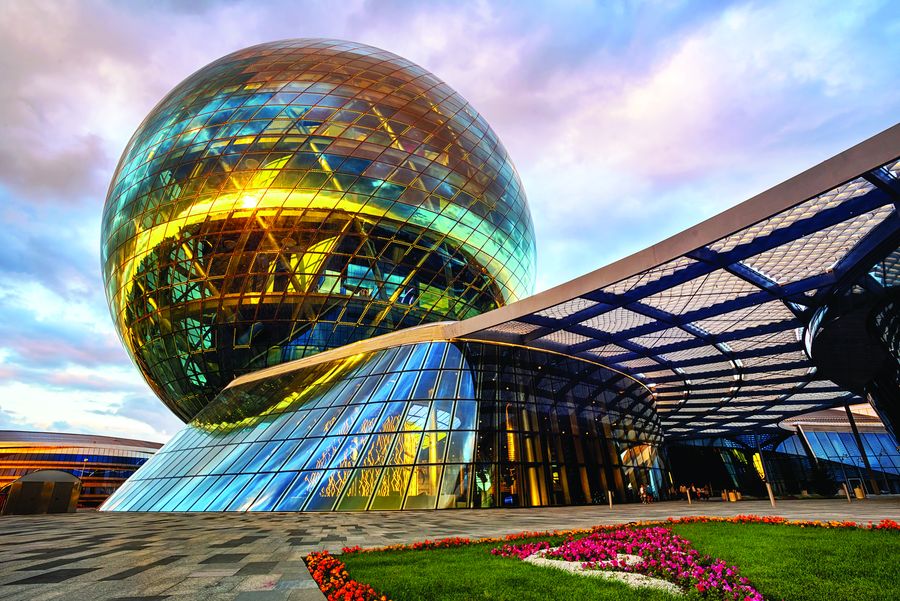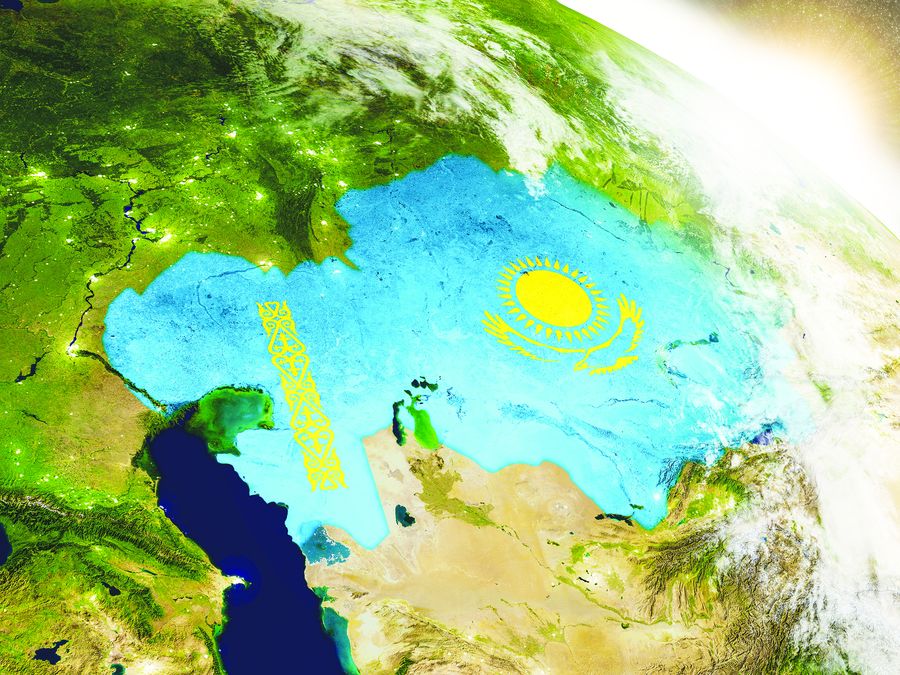Think of a young, rapidly developing country, rich in natural resources, with some of the biggest oil and gas reserves in the world, that generates billions of dollars annually and of which over 70% of the population is Muslim. No, this is not one of the rich Gulf principalities. This country has had close diplomatic and economic ties with Israel for decades. It is Kazakhstan, of course, which used to belong to the Soviet Union and since its independence some 30 years ago, has been advancing by leaps and bounds and growing into its tremendous economic potential.
For those who are as yet unfamiliar with its stats, consider the following: Kazakhstan is an enormous country located mostly on the Asian continent and partially in Europe, stretching across territory of around 2.7 million square kilometers – making it the tenth largest country in the world in terms of territory and controlling great natural deposits. It borders from Russia to the north, China to the east and Kyrgyzstan and Turkmenistan to the south. Its proximity to the economic powers of Russia and China, the Kazakh state’s main allies and strategic trading partners, gives it special status as an important and rapidly growing regional trade center.

The country’s current population stands at 19 million people, of which around two thirds are Kazakh. Its cultural relation to its northern neighbor is demographically notable too – around 20% of the population is of Russian descent, which contributes to the country’s diversity – while a large majority belong to Islam, more than a quarter of Kazakhstan’s inhabitants are Christian Orthodox. The country’s unique ethnic mix is also expressed in the local language – while Kazakh is the country’s official language, Russian is the primary inter-ethnic language of communication, such that Russian-speaking Israelis could comfortably maneuver there.
Thanks to its size and location, Kazakhstan is rich in numerous natural resources such as oil, natural gas, coal, iron, manganese, chromium, nickel, copper, graphite, zinc, gold and uranium. The oil and gas industry alone generates major annual income for the country which comes to around 30 billion dollars and makes it possible for the government to invest in national projects and development programs, as it has done over recent years. This is where Kazakhstan’s interest in Israel as a strategic partner and important ally comes in; Israel has a strong track record in diversifying sources of economic growth, while promoting innovation and the economy. And this interest is not one-sided. Many Israeli business people have been noticing Kazakhstan’s impressive development and significant financial reforms initiated by the government in recent years, as well as the meteoric growth of the real estate and tourism sectors and the large and diverse population, an interesting new target demographic for many business opportunities.
This partnership is hardly new. Connections between the countries go back many years. In fact, Israel and Kazakhstan have maintained political and economic relations since the dissolution of the Soviet Union and the founding of Kazakhstan – relations that are well-established and grow stronger from one year to the next. The two countries established diplomatic relations and the opening of official missions as early as 1992; Israel opened an embassy in Almaty (the capital city at that time) in August of that year, while a parallel embassy was inaugurated in Tel Aviv in May of 1996.
The two countries’ economic ties have grown over the years. If in its first years of trade, the annual volume stood a just a few million dollars, over the years it has grown exponentially and today stands at around half a billion dollars a year. Kazakhstan supplies Israel with about a quarter of its annual oil and Israel sells its Kazakh friend advanced technology, primarily from the tech sectors of IT, agro-tech and irrigation.

So it is no wonder that in recent years there has been significant progress in negotiations for Israel to sign a free trade agreement with the Eurasian Economic Union, in which Kazakhstan is a founding partner along with Russia, Armenia, Kyrgyzstan and Belarus. This agreement is projected to significantly advance Israel’s economic and trade cooperation with the union’s members – and Kazakhstan in particular.
The strengthening of ties between Israel and Kazakhstan took on another important expression at the beginning of 2017 when it was decided that Israelis no longer require visas to visit and are permitted to enter the country freely. At the start of 2020, before the coronavirus took over, there was major progress with the plan to operate direct flights between Tel Aviv and Almaty. The plan is expected to be launched as soon as 2021 – another initiative which attests to the significant development of economic, political and cultural ties between the countries, which have gained significant momentum in recent years.
As Israel and Kazakhstan’s trade and economic relations have grown closer, the scope of Israeli ventures and investments in Kazakhstan have likewise grown, to around 140 ventures in a variety of fields, from investments and initiatives in the high-tech, finance and pharmaceutical industries to construction, irrigation and tourism.
Anyone who is closely following the country’s rapid developments will not be at all surprised by this data, which indicates a clear increase in the volume of business activity. Indeed, Kazakhstan’s government is very open and business-friendly, encouraging extensive initiatives and programs to promote investment and innovative technological initiatives. Like the rich Gulf states, Kazakhstan also recognizes the vital need for a transition from an oil-driven economy to an innovation-based, technology-based, business-oriented economy with advanced financial services and a developed tourism sector.
In a recent speech to the nation delivered by President Kassym-Jomart Tokayev, the president emphasized the government’s commitments to innovative reform processes. “Creating a technological and diverse economy is not only a necessity for us, but a scenario for which there is no alternative,” he said. In this speech, President Tokayev listed a number of important principles, envisioning a kind of roadmap to outline the policy required in order to achieve their goals, which include: promoting business freedom and private initiative; encouraging reasonable competition and development of the markets for the new generation of entrepreneurs; increasing productivity and technological efficiency; human capital development and investment in innovative education methods, preservation of the environment and development of a progressive, green economy.
Elections in Kazakhstan
On January 10, 2021 Kazakhstan will hold elections to Mazhilis – the lower chamber of Parliament. The Government of Kazakhstan believes that with the expiration of the Mazhilis representatives’ elected term lengths, elected in 2016, the holding of timely elections is important in order to effectively continue the democratic process nationwide.
President of Kazakhstan Kassym-Jomart Tokayev who himself has been elected in June 2019 (at that time presidential election saw seven candidates on the ballot – representing the broad political opinions of all citizens – and featuring the first female presidential candidate in our country’s political history), is adhering to the development of democracy in Kazakhstan through the concept of a listening state: the creation of the National Council of Public Trust, the adoption of a new comprehensive law on rallies, the reduction of barriers to political party registration, the decriminalisation of libel and other innovations that were initiated during the presidency. This has increased the confidence in the state and the effectiveness of public administration on the part of the population.

One of the examples of the further democratisation of the political process was the successful holding in 2020 of primaries by “Nur-Otan”, the largest political party in Kazakhstan. This was conducted for the first time in the history of the country.
President Tokayev reaffirmed his commitment to encourage the development of a healthy multi-party system, noting the importance of a competitive political environment in facilitating building a modern, effective and stable state.
The number of signatures required to create a political party able to participate in elections has been reduced by half (to 20,000) – a crucial step in activating Kazakhstan’s political life and strengthening the role of parties’ influence in the political process. Parties including Nur Otan, Ak Zhol, the Communist People’s Party, Auyl, the Nationwide Social Democratic Party and Birlik (renamed to “Adal” in November 2020) have expressed their interest in joining election campaign.
The Government of Kazakhstan believes that free and fair elections are the cornerstone of its democracy. For this reason, the Constitution guarantees freedom of expression and prohibits censorship. All registered political parties are free to participate in the election, and the government always encourages their participation. Competition between political parties is healthy for the democratic process of Kazakhstan and the government welcomes rivalry between the parties.
Therefore the election of new MPs among six parties who have registered by now illustrating the multiparty nature of Kazakhstan’s political system will continue the process launched by President Tokayev.
The International Finance Center | AIFC – The Astana International Finance Center
The Astana International Finance Center was founded and initiated by the Republic of Kazakhstan’s first president, Nursultan Nazarbayev, as part of the nation’s “100 Concrete Steps” program. The ambitious program for the implementation of institutional reforms in the country will serve as a platform for Kazakhstan to work toward its national goal of being among the thirty most developed nations in the world by 2050. An important step in this master plan was to make major advances with Kazakhstan’s financial center to become one of the 20 most advanced financial centers in the world.
To that end, as part of the progressive reforms which Kazakhstan has been undergoing in recent years, the financial center has been established, effectively positioning the country as a leading international investment center. Indeed, as Astana’s international finance center, it has played a key role in attracting investment and financial resources and has served as a financial hub for many Central and East Asian countries, as well as countries in the Caucasus, the Eurasian Economic Union, the middle East and Europe.
The sophisticated, state-of-the-art financial center offers encouraging conditions, including independent financing regulation in accordance with the most stringent international standards and meeting the highest standards of leading international investors. Thanks to the existence of an independent, international legal framework, which has undergone a special presidential order, the organization actually operates as a separate legal entity, operated and managed on the basis of the principles of British law and made up of foreign experts.
In recent years, the number of private companies, individual entrepreneurs, governmental authorities and international corporations working closely with the AIFC has steadily increased. In return, they are granted many business opportunities, diverse routes to a variety of investment options, as well as special benefits and preferential terms. For instance, AIFC members are entitled to long-term tax benefits over fifty years as well as exemption from payment of personal and corporate income tax or significant relief in obtaining work visas for employees – given to all workers for extended periods of time. Furthermore, citizens of OECD countries (including Israeli citizens) are entitled to enter the country without a visa for up to thirty days, in addition to which they are granted subsidies for renting high-quality offices for two years at no cost.
And it gets even more interesting, for both start-up and more established companies in the Israeli FinTech scene. As part of developing the FinTech industry, AIFC’s “FinTech Laboratory” initiates and manages support programs for innovative companies in the field through acceleration, cultivation, mentoring and flexible regulations. Starting in August of 2020, the FinTech Laboratory received over 120 requests for review and supported 23 different FinTech companies that offer a variety of services in the field of digital banking, digital payments or crowdfunding, among others.
Great Profit Potential
The finance center’s operations are growing at lightning speed. More and more companies from different countries have discovered the many advantages of working with the cutting-edge center. As of 2019, some 235 companies from 26 different countries were working with the AIFC. These companies included, among others, leading financial institutions and international investment banks such as WOOD & Company, one of the largest investment banks in Eastern Europe, the China Development Banks, the China Construction Bank and others.
Nor did COVID-19 stop the financial center’s bustling operations – in June 2020 it was reported that the number of organizations working in cooperation with the AIFC increased to 500 different organizations from 35 countries across the world. In the first half of 2020 alone, 122 new members were enrolled, with 70 of them registered during the peak of the outbreak.
The AIFC’s international network continues to grow rapidly. Among the organization’s professional partners, Israel is an important ally, maintaining close economic ties with Kazakhstan. As an important part of the growing and ongoing relations, a delegation of dignitaries, led by Governor Kairat Kelimbetov, who heads the AIFC, recently visited Israel.
The delegation met with senior figures in the Israeli economic and financial system, including the former Governor of the Bank of Israel, who oversees the capital market at the Ministry of Finance, the chairman of the stock exchange and a number of other experts and senior officials. Following the visit, a contract was signed between the AIFC and the Tel Aviv Stock Exchange for the provision of services for the AIFC in the field of cyber security.
A memorandum of understanding and cooperation was also signed with Ben-Gurion University and initial agreements were reached to bring over Kazakh experts to undergo special professional training in Israel in the fields of cyber security, technology and financial control.
There is no doubt that the visit, during which the foundations were laid for bilateral cooperation, was productive and fruitful for both sides. But it is clear that this is only the beginning and that the potential for economic and financial gain inherent in collaborations and future joint initiatives between Israel and Kazakhstan is tremendous.




